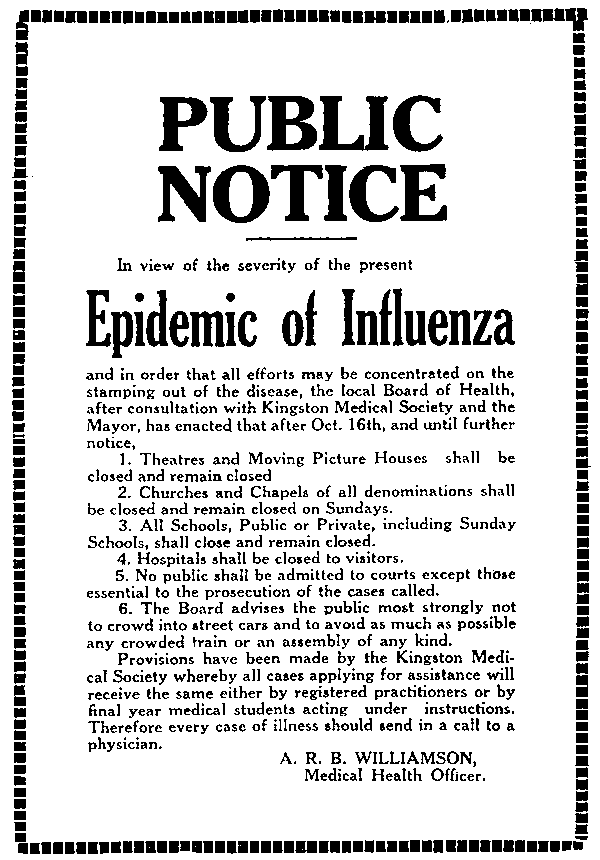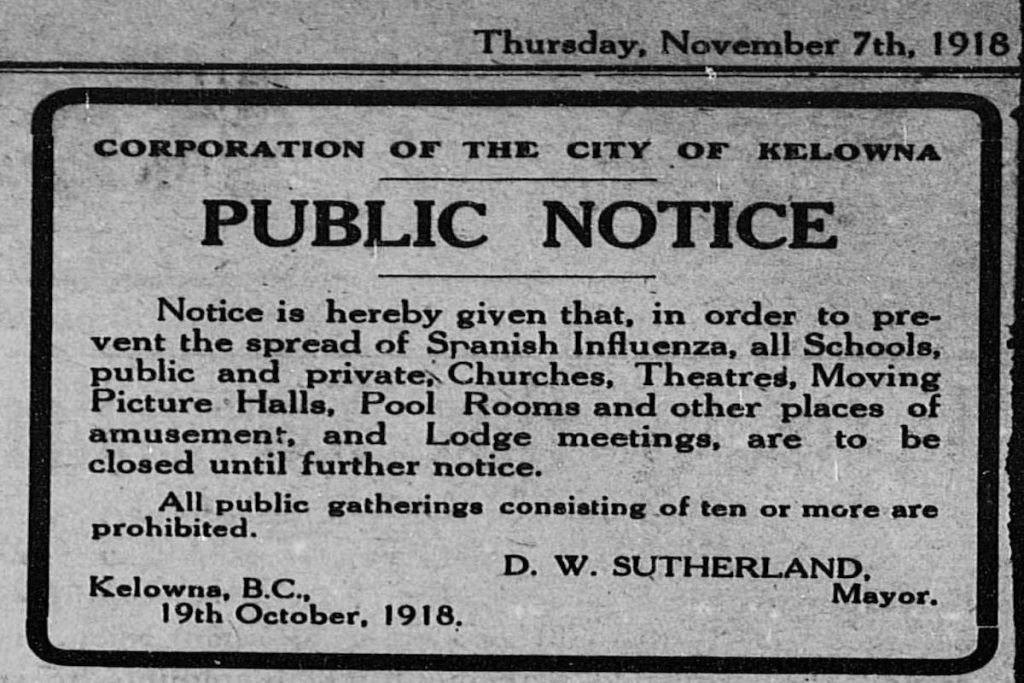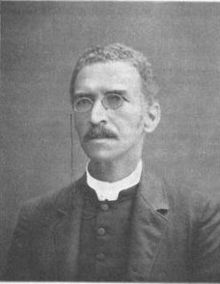[Published January 11, 2021]
Facing a pandemic is not a new experience for the Church and we can learn today from how the Church responded to previous pandemics and epidemics. CCCC members who would like to discuss this post may talk about it here in The Green.
The world has dealt with pandemics and plagues for thousands of years, and social distancing, quarantining, and even wearing masks have been ways humanity has responded before. Even closing churches in Canada for in-person services is not new, as the following two pictures show.


If you like to go down rabbit trails, although it does not deal with churches, this 432 year old manual written during the Black Death (Bubonic Plague) includes many measures that we are still using today!
Here is a brief overview of how the Church responded in previous pandemics.
The Ancient Church Responds to Pandemics
The ancient Church grew significantly because of its actions during the Antonine (165-180 A.D.) and Cyprian (249-262 A.D.) plagues. The Church did not social distance in those pandemics, but their refusal wasn’t so they could hold worship services—it was so they could care for the sick and bury the dead. Because everyone who was healthy, other than Christians, fled, these pandemics showed the pagan world by the actions of the Christians who remained how the Christian faith was a powerful new way to live.
The Early Protestant Church Responds to Pandemics
Martin Luther and John Calvin both adjusted their ministry activities to be socially responsible and deal with the plagues of their times (Calvin had to deal with five plagues!).
The North American Church Responds to a Pandemic
Finally, during the Spanish Flu epidemic of 1918, churches were closed all over the United States and Canada, yet they found creative ways to continue their work. Clergy of that time mostly supported public health measures that closed their churches and gave advice about what to do instead.
The link above about churches being closed includes this little nugget about the attitude of pastors to enforced church closings: the Washington DC Protestant ministerial recorded that, “An emergency meeting of ‘Protestant ministers’ on October 5, 1918, decided unanimously to ‘place ourselves on record as cheerfully complying with the request of the Commissioners.'” (I’ve added the italics for emphasis.) Dr. Mark Steinacher, church historian and an expert on the Canadian church, confirmed to me that “churches did indeed largely comply a century ago.”
There is very little documentation about legal challenges and civil disobedience during the Spanish Flu epidemic. One report refers to many legal challenges from the general public but that the judges were not sympathetic at all. Another report includes the following:
- In San Francisco, about 100 people were charged for not wearing masks. The Anti-Mask League of San Francisco only ever held one meeting but that meeting attracted 2,000 people in January 1919 to protest the requirement to wear a face mask, and it led to the mayor rescinding the order shortly afterwards. Unfortunately, with people tired of the flu, the relaxed regulations led to the second wave being many times worse than the first.
- The same report mentions that two Christian Scientist churches mounted legal challenges. The Portland, OR church said it believed they would not get sick and claimed “the police power of the state should not be used to prevent Christian worship in the churches.” They were unsuccessful, but the other church in Los Angeles won its case with the claim that religious groups were unfairly targeted by the restrictions.
Here are some excerpts from a sermon delivered by Rev. Francis J. Grimke on Sunday, November 3, 1918 at the Fifteenth Street Presbyterian Church in Washington, D. C. after churches reopened. I will quote several passages because they speak directly to the issues of our day, but with the benefit of hindsight that we don’t yet have.

Our own beautiful city has suffered terribly from [the flu], making it necessary, as a precautionary measure, to close the schools, theaters, churches, and to forbid all public gathering within doors as well as outdoors. At last, however, the scourge has been stayed, and we are permitted again to resume the public worship of God, and to open again the schools of our city.
Rev. Grimke went on to reflect about the experience.
I have been asking myself the question, what is the meaning of it all? What ought it to mean to us? Is it to come and go and we be no wiser, or better for it? Surely God had a purpose in it, and it is our duty to find out, as far as we may, what that purpose is, and try to profit by it.
What a great question to ask! The Bible assures us that God will work to redeem all situations for good. So what can we see God doing in his church today? Why wait until it is all over to look for God’s purpose? Can we see God at work in the Church and in the world even while we are in the midst of the pandemic? If you are a CCCC’s member or are registered with The Green, let’s talk about it.
Here are three of Rev. Grimke’s reflections and his closing summary statement.
This epidemic…has brought out in a way that is very gratifying, the high estimation in which the Christian church is held in the community—the large place which it really occupies in the thought of the people. The fact that for several weeks we have been shut out from the privileges of the sanctuary has brought home to us as never before what the church has really meant to us. We hadn’t thought, perhaps, very much of the privilege while it lasted, but the moment it was taken away we saw at once how much it meant to us.
In his day, the community thought well of churches, something we cannot take for granted today. And it seems that churchgoers gained a fresh appreciation for public worship that made them appreciate their churches all the more. The Baptist Standard also found this benefit when it summarized what it learned from the historical records of Baptist churches and organizations. It reports, “It seems from evidence from churches around the country, one benefit of the brief loss of Sunday services was a new appreciation for the value of fellowship and Christian community.” This was a collateral benefit that at least partially redeemed the closings.
The following excerpt is the crucial one as far as the debate about civil disobedience is concerned.
Another thing that has impressed me, in connection with this epidemic, is the fact that conditions may arise in a community which justify the extraordinary exercise of powers that would not be tolerated under ordinary circumstances. This extraordinary exercise of power was resorted to by the Commissioners in closing up the theaters, schools, churches, in forbidding all gatherings of any considerable number of people indoors and outdoors, and in restricting the numbers who should be present even at funerals. The ground of the exercise of this extraordinary power was found in the imperative duty of the officials to safeguard, as far as possible, the health of the community by preventing the spread of the disease from which we were suffering.
And then, just as now, there were disagreements about closing churches. Here’s Rev. Grimke’s take on the closings.
There has been considerable grumbling, I know, on the part of some, particularly in regard to the closing of the churches. It seems to me, however, in a matter like this it is always wise to submit to such restrictions for the time being. If, as a matter of fact, it was dangerous to meet in theaters and in the schools, it certainly was no less dangerous to meet in churches. The fact that the churches were places of religious gathering, and the others not, would not affect in the least the health question involved. If avoiding crowds lessens the danger of being infected, it was wise to take the precaution and not needlessly run in danger, and expect God to protect us.
For a sample of some of that grumbling, and to see how the issues are just the same today, read this article, which also includes some comment about how churches thrived while closed.
Finally, just like many pastors today, Rev. Grimke was anxious to be back in the pulpit with his congregation before him, but he found a faithful way to think about the situation.
And so, anxious as I have been to resume work, I have waited patiently until the order was lifted. I started to worry at first, as it seemed to upset all of our plans for the fall work; but I soon recovered my composure. I said to myself, why worry? God knows what He is doing. His work is not going to suffer. It will rather be a help to it in the end. Out of it, I believe, great good is coming. All the churches, as well as the community at large, are going to be the stronger and better for this season of distress through which we have been passing.
I found it helpful, as I think you will too, to hear directly from a pastor from a century ago who went through what we are going through today and learn from how he responded to the same restrictions.
The public health measures and debates of 1918 were similar to ours today: they included “Stay at home; shop by phone (instead of shop online!) and “To mask or not to mask” (a headline in the L.A. Times).
Since the Internet and other mass communication channels were not available then, newspapers ran sermons each week, often rotating between churches. Again, the same article linked to above about churches closing reports that pastors told their congregations to conduct their own services at home, read a sermon from the newspaper, and pray.
Throughout history, the church has been a great witness to the beauty of Christianity and its care for our neighbours and people remembered what Christians did when the crises were over. The church has endured temporary closings before and resumed services once it was safe.
With this historical perspective as context, pastors today are wrestling with how the Church should respond to pandemic-related restrictions in today’s world. My next post will cover the four main options that are available. We all need God’s wisdom to choose the option that will best help us be a faithful Church in 2021.


